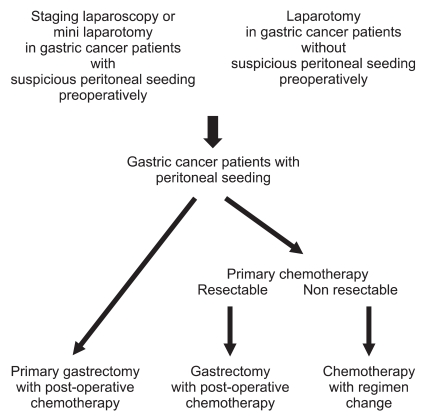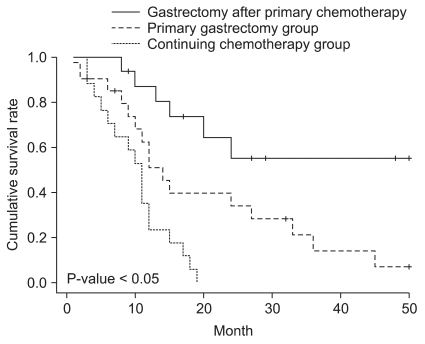J Gastric Cancer.
2011 Sep;11(3):167-172. 10.5230/jgc.2011.11.3.167.
Clinical Outcomes according to Primary Treatment in Gastric Cancer Patients with Peritoneal Seeding
- Affiliations
-
- 1Department of Surgery, Yeungnam University College of Medicine, Daegu, Korea. swkim@med.yu.ac.kr
- KMID: 2055514
- DOI: http://doi.org/10.5230/jgc.2011.11.3.167
Abstract
- PURPOSE
Peritoneal seeding of gastric cancer is known to have a poor prognosis. With the diagnosis of peritoneal seeding, there is no effective treatment modality. Gastrectomy with chemotherapy or primary chemotherapy is basically one of major options for this condition. This study was conducted to compare the clinical outcomes of these treatments and to identify the better way to improve the prognosis of patients with peritoneal seeding.
MATERIALS AND METHODS
Between 2001 and 2007, gastric cancer patients with peritoneal seeding by preoperative or intraoperative diagnosis were reviewed retrospectively. The enrolled patients were divided as primary gastrectomy and primary chemotherapy group. Clinicopathologic characteristics and clinical outcomes of groups were analyzed and compared.
RESULTS
Fifty-four patients were enrolled. 21 patients belonged to the group of primary gastrectomy and 33 patients were to the primary chemotherapy group. Among 33 patients of the primary chemotherapy group, 17 patients were received only chemotherapy and 16 patients were received gastrectomy due to the good responses of primary chemotherapy. The 3 years survival rates were 14% in primary gastrectomy group, 55% in patients who received gastrectomy after primary chemotherapy, and 0% in patients with primary chemotherapy only.
CONCLUSIONS
Although this study had many limitations, some valuable information was produced. In terms of survival benefits for the gastric cancer patients with peritoneal seeding, primary gastrectomy and additional gastrectomy after primary chemotherapy revealed the better clinical outcomes. But, prospective randomized clinical study and multi-center study are should be performed to decide proper treatment for gastric cancer patients with peritoneal seeding.
Keyword
Figure
Reference
-
1. Wisbeck WM, Becher EM, Russell AH. Adenocarcinoma of the stomach: autopsy observations with therapeutic implications for the radiation oncologist. Radiother Oncol. 1986; 7:13–18. PMID: 3775075.
Article2. Landry J, Tepper JE, Wood WC, Moulton EO, Koerner F, Sullinger J. Patterns of failure following curative resection of gastric carcinoma. Int J Radiat Oncol Biol Phys. 1990; 19:1357–1362. PMID: 2262358.
Article3. Gunderson LL, Sosin H. Adenocarcinoma of the stomach: areas of failure in a re-operation series (second or symptomatic look) clinicopathologic correlation and implications for adjuvant therapy. Int J Radiat Oncol Biol Phys. 1982; 8:1–11. PMID: 7061243.
Article4. Yonemura Y, Fujimura T, Fushida S, Takegawa S, Kamata T, Katayama K, et al. Hyperthermo-chemotherapy combined with cytoreductive surgery for the treatment of gastric cancer with peritoneal dissemination. World J Surg. 1991; 15:530–535. PMID: 1891941.
Article5. Ryu KW, Mok YJ, Kim SJ, Kim CS. Prognostic factors in advanced gastric cancer with peritoneal carcinomatosis. J Korean Surg Soc. 2000; 59:786–792.6. Chu DZ, Lang NP, Thompson C, Osteen PK, Westbrook KC. Peritoneal carcinomatosis in nongynecologic malignancy. A prospective study of prognostic factors. Cancer. 1989; 63:364–367. PMID: 2910444.7. Sadeghi B, Arvieux C, Glehen O, Beaujard AC, Rivoire M, Baulieux J, et al. Peritoneal carcinomatosis from non-gynecologic malignancies: results of the EVOCAPE 1 multicentric prospective study. Cancer. 2000; 88:358–363. PMID: 10640968.8. Wilke H, Preusser P, Fink U, Gunzer U, Meyer HJ, Meyer J, et al. Preoperative chemotherapy in locally advanced and nonresectable gastric cancer: a phase II study with etoposide, doxorubicin, and cisplatin. J Clin Oncol. 1989; 7:1318–1326. PMID: 2769330.
Article9. D'Ugo D, Persiani R, Rausei S, Biondi A, Vigorita V, Boccia S, et al. Response to neoadjuvant chemotherapy and effects of tumor regression in gastric cancer. Eur J Surg Oncol. 2006; 32:1105–1109. PMID: 16930932.10. Sugarbaker PH, Yonemura Y. Clinical pathway for the management of resectable gastric cancer with peritoneal seeding: best palliation with a ray of hope for cure. Oncology. 2000; 58:96–107. PMID: 10705236.
Article11. Stern JL, Denman S, Elias EG, Didolkar M, Holyoke ED. Evaluation of palliative resection in advanced carcinoma of the stomach. Surgery. 1975; 77:291–298. PMID: 1129702.12. Kim HI, Ha TK, Kwon SJ. Prognostic factors in gastric cancer patients with peritoneal carcinomatosis. J Gastric Cancer. 2010; 10:126–132.
Article13. Japanese Gastric Cancer Association. Japanese Classification of Gastric Carcinoma - 2nd English Edition. Gastric Cancer. 1998; 1:10–24. PMID: 11957040.14. Ikeguchi M, Oka A, Tsujitani S, Maeta M, Kaibara N. Relationship between area of serosal invasion and intraperitoneal free cancer cells in patients with gastric cancer. Anticancer Res. 1994; 14:2131–2134. PMID: 7840512.15. Sugarbaker PH. Peritonectomy procedures. Surg Oncol Clin N Am. 2003; 12:703–727. PMID: 14567026.
Article16. Kuramoto M, Shimada S, Ikeshima S, Matsuo A, Yagi Y, Matsuda M, et al. Extensive intraoperative peritoneal lavage as a standard prophylactic strategy for peritoneal recurrence in patients with gastric carcinoma. Ann Surg. 2009; 250:242–246. PMID: 19638909.
Article17. Hunerbein M, Rau B, Hohenberger P, Schlag PM. Th e role of staging laparoscopy for multimodal therapy of gastrointestinal cancer. Surg Endosc. 1998; 12:921–925. PMID: 9632861.18. Song SC, Lee SL, Cho YK, Han SU. The role and efficacy of diagnostic laparoscopy to detect the peritoneal recurrence of gastric cancer. J Korean Gastric Cancer Assoc. 2009; 9:51–56.
Article19. Shimizu H, Imamura H, Ohta K, Miyazaki Y, Kishimoto T, Fukunaga M, et al. Usefulness of staging laparoscopy for advanced gastric cancer. Surg Today. 2010; 40:119–124. PMID: 20107950.
Article20. Yonemura Y, Bandou E, Sawa T, Yoshimitsu Y, Endou Y, Sasaki T, et al. Neoadjuvant treatment of gastric cancer with peritoneal dissemination. Eur J Surg Oncol. 2006; 32:661–665. PMID: 16621433.
Article21. Glehen O, Gilly FN, Arvieux C, Cotte E, Boutitie F, Mansvelt B, et al. Association Française de Chirurgie. Peritoneal carcinomatosis from gastric cancer: a multi-institutional study of 159 patients treated by cytoreductive surgery combined with perioperative intraperitoneal chemotherapy. Ann Surg Oncol. 2010; 17:2370–2377. PMID: 20336386.
Article22. Badgwell B, Cormier JN, Krishnan S, Yao J, Staerkel GA, Lupo PJ, et al. Does neoadjuvant treatment for gastric cancer patients with positive peritoneal cytology at staging laparoscopy improve survival? Ann Surg Oncol. 2008; 15:2684–2691. PMID: 18649106.
Article23. Hioki M, Gotohda N, Konishi M, Nakagohri T, Takahashi S, Kinoshita T. Predictive factors improving survival after gastrectomy in gastric cancer patients with peritoneal carcinomatosis. World J Surg. 2010; 34:555–562. PMID: 20082194.
Article24. Kwon SJ. Investigation of long-term survivors with stage IV gastric cancer. J Korean Gastric Cancer Assoc. 2002; 2:157–162.
Article25. Seo YJ, Bae JM, Kim SW, Kim SW, Song SK. Different clinical outcomes of stage IV gastric cancer according to the curability of surgery. J Korean Surg Soc. 2009; 77:170–176.
Article26. Pollock RE, Roth JA. Cancer-induced immunosuppression: implications for therapy? Semin Surg Oncol. 1989; 5:414–419. PMID: 2688031.
Article27. Yoon SY, Kim MG, Oh ST. Th e impact of preoperative chemotherapy on the surgical management of unresectable gastric cancer. J Korean Gastric Cancer Assoc. 2009; 9:269–274.
- Full Text Links
- Actions
-
Cited
- CITED
-
- Close
- Share
- Similar articles
-
- The Result of Conversion Surgery in Gastric Cancer Patients with Peritoneal Seeding
- Effect of Radical Removal of Primary and Metastatic Lesions in Gastric Cancer with Peritoneal Seeding
- Erratum to: Clinical Outcomes according to Primary Treatment in Gastric Cancer Patients with Peritoneal Seeding
- Long-term Clinical Outcomes and Risk of Peritoneal Seeding after Endoscopic Submucosal Dissection for Early Gastric Cancer: A Focus on Perforation during the Procedure
- A Case of Small Bowel GIST Initially Suspected as Peritoneal Seeding of Gastric Cancer



